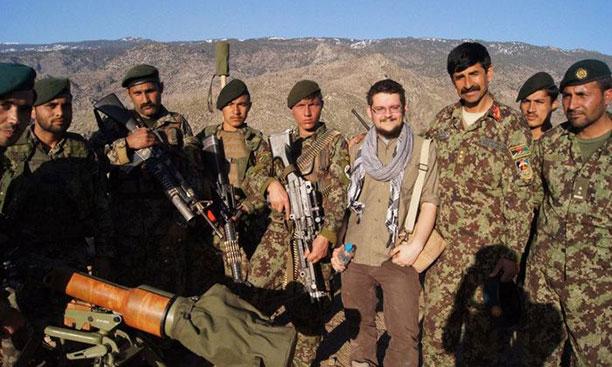
In the middle of a Baghdad palace formerly belonging to Saddam Hussein, veteran Rolling Stone and Vanity Fair writer Evan Wright stood annoyed.
Moments earlier, Wright, who was in Iraq to cover the 2007 surge in U.S. forces there, had just had his conversation with two special assistants to Gen. David Petraeus *85 *87 interrupted. What’s more, the teenager responsible for horning in on the conversation looked a lot like Harry Potter — “from the early movies,” Wright recalled.
The Potter look-alike was Wesley Morgan ’11, then still a blogger for The Daily Princetonian. Wright didn’t stay annoyed at him for long.
“He had an incredibly detailed knowledge of force dispositions across the Mideast,” Wright said. “He knew, like, everything.”
How did this ecosystem of bases — and endless violence — come to be? Answers to Morgan’s most basic questions were hard to come by.
Soon, Wright sought to take advantage of Morgan’s knowledge by consulting him before interviews — to ensure he had a complete picture of whomever he was preparing to meet.
A self-described “military history nerd,” Morgan grew up in Watertown, Mass., where his high school lacked a student newspaper. He joined the Prince as a freshman.
An interview that year with Petraeus, a Wilson School graduate who was then the commander of U.S. forces in Iraq, turned into a summer embedded with troops. There, Morgan demonstrated to war reporters, including Wright and longtime New York Times military correspondent Michael Gordon, that he had a willingness to go wherever the stories led him.
On one occasion, Morgan volunteered to go with troops struggling to defend against a type of explosive designed to penetrate armored vehicles, recalls Wright, who tried to stop his young colleague. Morgan refused. He didn’t want to be in Iraq and not follow certain stories, he told Wright.
That desire to follow the story brought Morgan back to Iraq in 2008 and then, with some time off from school, to Afghanistan in 2009 and 2010.
With its jagged peaks and green valleys, veterans say Afghanistan’s northeastern Kunar province resembles Colorado or Alaska. Mountains mark the border with Pakistan to the east. And bisecting the province lengthwise is the Kunar River, a major tributary of which is called the Pech.
Despite its beauty, the Pech River valley — like its more well-known Korengal valley neighbor — was also incredibly deadly. U.S. troops held the remote territory through a series of outposts, one of which was notorious for being the most frequently attacked in eastern Afghanistan, said Morgan.
How did this ecosystem of bases — and endless violence — come to be? Answers to Morgan’s most basic questions were hard to come by, as each unit’s memory only extended to the unit it succeeded.
Osama bin Laden, Morgan would learn, had a lot to do with U.S. involvement in the Pech — at least, initially. The Al-Qaeda leader was said to have passed through the area after his escape from the Tora Bora caves and the U.S. was keen to pick up his trail. But what started as a counterterrorism operation cycled back and forth into full-fledged counterinsurgency for years.
Morgan wanted to know, among other things, whether it was all worth it. The remote valley was of questionable strategic importance and, with its lack of infrastructure, supplying it was exceedingly difficult.
Realizing, however, that working as a teenage freelancer without a college degree was perhaps not the most sustainable lifestyle, Morgan first sought to answer his questions in a senior thesis that would allow him to graduate. In his thesis evaluation, adviser Michael Reynolds noted that the subject of recent U.S. military operations in a remote area of Afghanistan “does not lend itself easily to research,” but that Morgan “succeeded admirably.”
Morgan, however, was far from done. Years later, now a defense reporter at Politico, Morgan is nearing completion of a book on the Pech River valley. In it, he also pulls in the perspective of Afghan Army troops, with whom he embedded, as well as the memories of Soviet veterans.
“People will talk to you for things in a book that they won’t for a story coming out tomorrow or next week,” Morgan said. “There’s a longer flash-to-bang.”
Among those people is Col. William Ostlund, director of military instruction at West Point, who served 15 months in the area. He said Morgan will be producing a “lifetime of lessons” from the Pech.
Joseph Holliday ’06, who served in Kunar as an intelligence officer with the 101st Airborne Division, also hopes Morgan’s “longer arc perspective” will help the U.S. parse the lessons it learned in Afghanistan.
“People like to say we haven’t learned from previous experience, but that’s not true,” said Holliday, whom Morgan consulted for the book. “The work done by historians was applied — and applied constructively — to how we dealt with Iraq and Afghanistan. I believe it will be so for these latest wars as well.”
